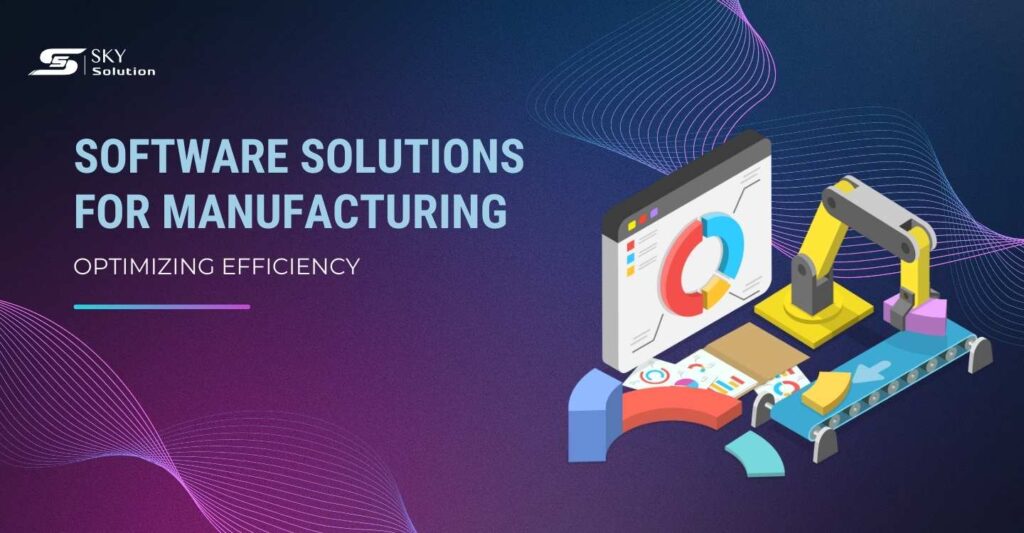In today’s fast-paced industrial landscape, software solutions for manufacturing play a crucial role in streamlining operations and enhancing productivity. From managing your supply chain to overseeing real-time monitoring of production processes, the right manufacturing engineering software can significantly impact your bottom line. Understanding how these software systems function and their potential advantages for manufacturing facilities is essential for staying competitive in the market.
What is manufacturing software?
Manufacturing software is a digital tool designed to help manufacturers plan, manage, optimize manufacturing processes efficiently and cost-effectively. It also streamlines workflows and automates repetitive tasks, such as inventory management, warehouse operations, and production scheduling.
Companies can leverage manufacturing software to produce high-quality goods more quickly, at lower production costs, and with fewer errors, ultimately boosting productivity and increasing profitability.
Manufacturing software can also enhance customer experience by enabling the production of products that meet demand without compromising on quality or accuracy

Applications of Software Solutions for Manufacturing
1. Production Optimization
These digital tools can analyze production data and suggest improvements that enhance output. Features like automated scheduling and performance metrics help companies meet demand without overextending resources.
2. Inventory Management
Effective inventory management is vital for efficient manufacturing operations. Software solutions for manufacturing enable real-time tracking of materials and products, reducing the risk of stockouts or overstock situations. Automatic reorder notifications ensure that you have the right amount of inventory at all times.
3. Quality Control
Quality control is critical in manufacturing, and software solutions can help maintain high standards. By integrating quality checks throughout the production process, these systems can identify issues early, saving both time and costs associated with defects.

4. Process Automation
Integrating process automation tools into manufacturing workflows allows for reduced human error and improved speed. Automated tasks can include data entry, machine operation, and reporting, all of which help in simplifying complex processes.
5. Supply Chain Integration
With effective software solutions, businesses can improve their supply chain integration. This leads to better collaboration with suppliers and partners, streamlined logistics, and enhanced visibility into the entire manufacturing process.
6. Data Analytics
Data analytics tools are essential for modern manufacturing operations. These platforms analyze vast amounts of data to provide insights into performance, trends, and operational bottlenecks. Utilizing data analytics enables manufacturers to make informed decisions, ultimately leading to improved strategies and outputs.
7. Resource planning:
Manufacturing tools enable businesses to efficiently allocate and manage their resources. By optimizing resource usage, manufacturers can minimize waste, reduce downtime, and ensure that production schedules are met on time.
Manufacturing software development services
Many companies, particularly small businesses, face challenges when implementing software into their operations. These difficulties often arise from limited budgets, insufficient technical expertise, and resistance to change within the organization.
To implement software efficiently and cost-effectively, using development services for manufacturing is vital. These services help adapt existing solutions or create new ones that better serve your operation’s needs. By associating with expert developers, manufacturers can leverage technology more efficiently, yielding long-term benefits.
Custom manufacturing software development can directly address the unique needs of a production facility. Off-the-shelf solutions may not always fit specific operational requirements, which is where custom software becomes invaluable. Tailored solutions often result in better integration with existing systems and improved overall performance.
Creating software that aligns with your processes enhances usability and ensures that your teams can work more efficiently. Engaging with manufacturing software development services allows for initial consultations that can educate your organization about available options and tailor solutions to your needs.
Benefits of Software Solutions for Manufacturing
Investing in development services for manufacturing can provide numerous benefits:
- Time Efficiency: Automating processes decreases manual intervention, allowing employees to focus on higher-value tasks.
- Cost Reduction: Optimized operations help reduce waste and excess inventory, leading to lower overall costs.
- Scalability: Customized solutions can grow with your business, adapting to new challenges and opportunities.
- Real-time Monitoring: Track performance and progress continuously, allowing for timely adjustments to operations.
- Predictive maintenance: AI technologies enable businesses to monitor the real-time condition of machinery and predict potential failures before they occur. This proactive approach reduces unplanned downtime, minimizes costly repairs, and extends equipment lifespan.
- Improved product quality: AI solutions can be able to identify inefficiencies and potential defects early, allowing manufacturers to address issues before they impact the final output.

How to Choose the Right Manufacturing Software Consultants
When choosing software solutions for your business, selecting the right manufacturing software consultants can significantly impact your project’s success. Consider the following when seeking consultation:
- Assess your needs: Firstly, you should identify software for manufacturing companies. It’s essential to have a clear understanding of your project goals and the specific type of software required to achieve them. For instance, do you need software for optimizing your product or process? Do you need software that can control the quality of products and detect defects? Clearly defining your needs and goals helps you narrow your options and prioritize the features and functions that matter most.
- Compare the options: After identifying software solutions for manufacturing companies, you need to have a list of potential software options that match your needs. Consider various criteria such as cost, the provider’s experience, the range of software solutions they offer, reliability, customer support, and feedback from other users. Additionally, look at factors such as user-friendliness, support options, and security features. It’s also helpful to read reviews and ask for case studies or demonstrations to understand how the software has benefited similar companies.
- Request a demo: Before purchasing software, it’s crucial to test it thoroughly to ensure it meets your expectations and requirements. Use a free trial, demo version, or sample project to evaluate its functionality, usability, and performance. It’s also important to assess the software’s support and customer service by reaching out with questions or concerns to gauge their responsiveness and helpfulness. Additionally, test the software’s flexibility and adaptability to determine how easily it can be customized, updated, or upgraded to align with your evolving needs. A demo or trial provides a firsthand experience of the software’s strengths and limitations, enabling you to make a well-informed decision.
- Evaluate the results: After using the free trial of the software solutions, you should assess your results to determine if they align with your expectations and goals. Measure the software’s impact on your project’s quality, efficiency, productivity, and profitability to gauge its effectiveness.
- Choose your software: By carefully weighing these factors, you can make an informed decision that enhances your manufacturing operations and drives business growth.
Conclusion
Software solutions for manufacturing are indispensable assets in today’s competitive market. By investing in systems that enhance production optimization, inventory management, and data analytics, companies can achieve significant efficiencies and drive growth. Engage with experienced manufacturing software development services and consultants to explore tailored solutions robust enough to meet your evolving operational demands. Investing in manufacturing software not only enhances efficiency but also drives innovation and long-term growth. With the right systems and expert guidance, companies can remain competitive and adapt to the ever-changing industrial landscape, securing their place as leaders in their sector.
You can learn more about the technology roadmap at here.

